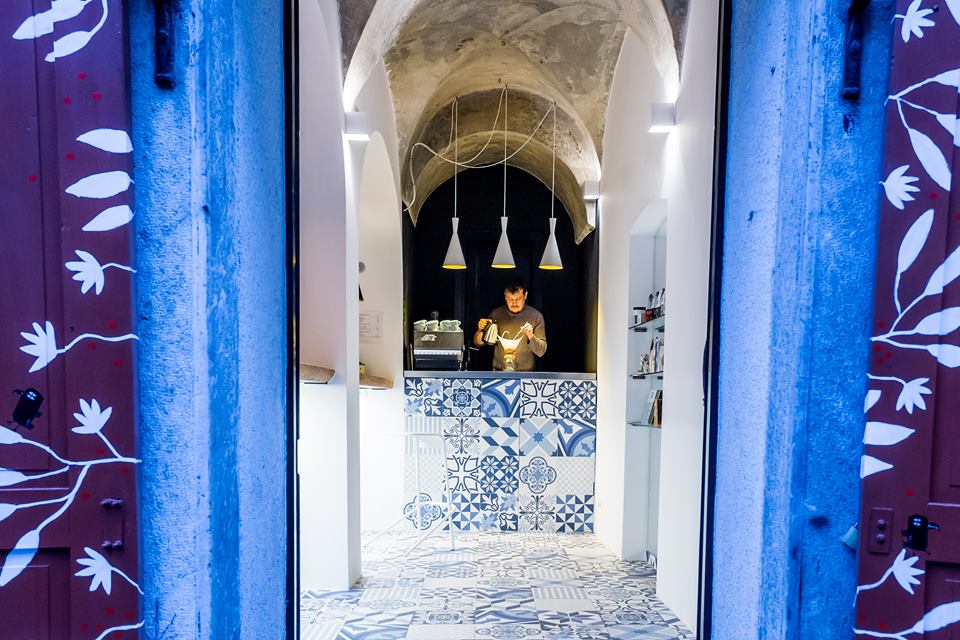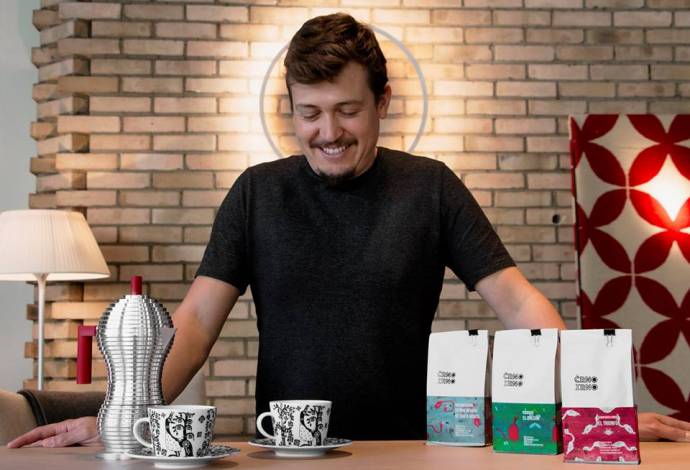Just up the hill on Gornji trg is still rather quiet, for the Old Town, but in recent years has seen a growing number a boutique hotels and stores opening up, and more people following one of the more interesting walks to the castle that can be reached by turning left at the end of the lane, going up Ulica na Grad. Recent arrivals include the bakery Pekarna OSEM and a little coffee store called Črno Zrno, or black bean, which sells single origin beans from Colombia, run by Alexander Niño Ruiz. The store has a short menu of coffees made with an espresso machine, Hario V60, Chemex or Aeropress, along with tea and juice.
I stopped by one morning for a cup and listened to what Alex had to say about his business.
Why are you in Slovenia?
Like everyone, I came here because of my wife, who I met when I was traveling in Poland. I was living in California then, studying a Master’s in urban planning at UCLA. I was working in a local architectural firm, designing restaurants. We had a long-distance relationship for two years, and then I decided to move here, and that was 10 yrs ago. We got married that year, and then in 2012 we went to Colombia, and then back here in 2016.
Opening a business here wasn’t easy. I mean, I’m married with a Slovenian, and you have to count on that, to have a local partner, so they can deal with all the bureaucracy. The regulations would be more difficult if we had a restaurant but since I was an architect meeting all the building standards for a café wasn’t a problem.
How did you get into the coffee business?
Colombia has a strong culture of producing coffee, we are the largest exporters of washed arabicas in the world, but it doesn’t really have a culture of coffee places. Coffee is something you drink at home, in your office, as a courtesy, and it’s usually filter coffee, not espresso. But the coffee we drink in Colombia is low quality, and coarser, so it needs to be filtered. Although instant coffee is fast and popular.
All my life I drank coffee in Colombia, but in America I stopped. I didn’t like it, the filter coffee, and I didn’t want to add sugar to it. Then when I came to Slovenia I started drinking espresso, the Italian coffee culture. Then I went back to Colombia, doing architecture, and started thinking about this when I decideded to return to Slovenia.
There was also this project to bring good quality coffee to the local people in Bogata, and I met this couple, in their 30s, who were in the specialty coffee business. Sourcing high quality coffee, roasting it, and selling it to locals. This is what I want to introduce to Slovenia, because drinking coffee is the end of a long chain, and you don’t know who is doing what, who is growing the coffee, who is roasting the beans, then maybe they mix the beans with something low quality, and then they roast the coffee very dark. A lot of information is lost in this process, but what this couple did was cut this chain, because they knew the farmer, and they knew the consumer. And I do the same thing, more or less. I know the farmer, and I know the roaster. The coffee you are drinking is a variety of called caturra arabica, grown by Liliana Ortiz in Pitalito, Huila, and I am in direct contact with the roasters in Colombia, who have close links with the growers. I import the green beans and work with a local roaster in Kamnik, STOW coffee roasters, they develop roasting profiles for the beans I am brewing in my store.

How difficult is importing the beans?
It took a lot of emails to get the coffee here, because I don’t buy full containers, and my first contact are the roasters in Colombia. The big companies get whole containers, then they go into the big distribution chains. I started with 210 kilos of green beans, divided up into four different firms, so no one was paying attention to me, and that made it more difficult. No one wanted to do the logistics for such a small amount. But I was lucky. A specialty coffee company in Colombia, which had been in business more than fifteen years in Australia and USA, started operations in Europe last year. They were offering very good coffee, and I asked if they could transport the coffee I was choosing, from a roaster in Salento, Quindio. The roaster is a guy who has his own coffee shop, roasted his own coffee, was the son of a third-generation coffee farmer, and he helped me choose some beans from the center and north of Colombia. So I buy from this roaster and also the logistics company.
But it’s not simple, you have to plan ahead. I have to make the order one month in advance of the harvest, with the harvest happening once or twice a year, depending on the climate and the latitude. If I don’t pay attention to when the harvest is, then I’ll get an order from the previous one, and it’s not so fresh. But after the harvest you have to wait a few weeks or months for the beans to dry, then they go to a facility and get sorted. So in Colombia it can take a month to get everything ready, and then I have to wait for a container my order can go in. It can be two or three months to get an order here.
How important is you working in the store?
I didn’t want to have distributors, I wanted my coffee to reach the final client without the middle man, to sell the coffee and have conversations. That’s why we picked this location in the centre, or close to the centre and the tourist area, that would be affordable for us, that allows us to be flexible and charge a good price.
We opened in March 2017, and the coffee we use here, and sell here, is only ours, the coffee we bring in, which is roasted every week and ground fresh for each customer. And coffee isn’t like beer or wine, which you can just buy in a bottle, serve at the right temperature and enjoy. With coffee the preparation is really important, and that’s where the barista comes in. How to extract coffee is really important, how to manage the variables of flavouring water with coffee.
That’s why I’m sipping coffee all day, to check the taste and control the flavour. I make double espressos – one for the customer, one for me – to see if it’s over-extracted, under-extracted, to adjust the temperature and so on. I drink all day, but sleep very well.
You can visit Alex at Gornji trg 17 and try a cup between 10:00-18:00 Monday to Friday, or 09:00-18:00 at weekends.



